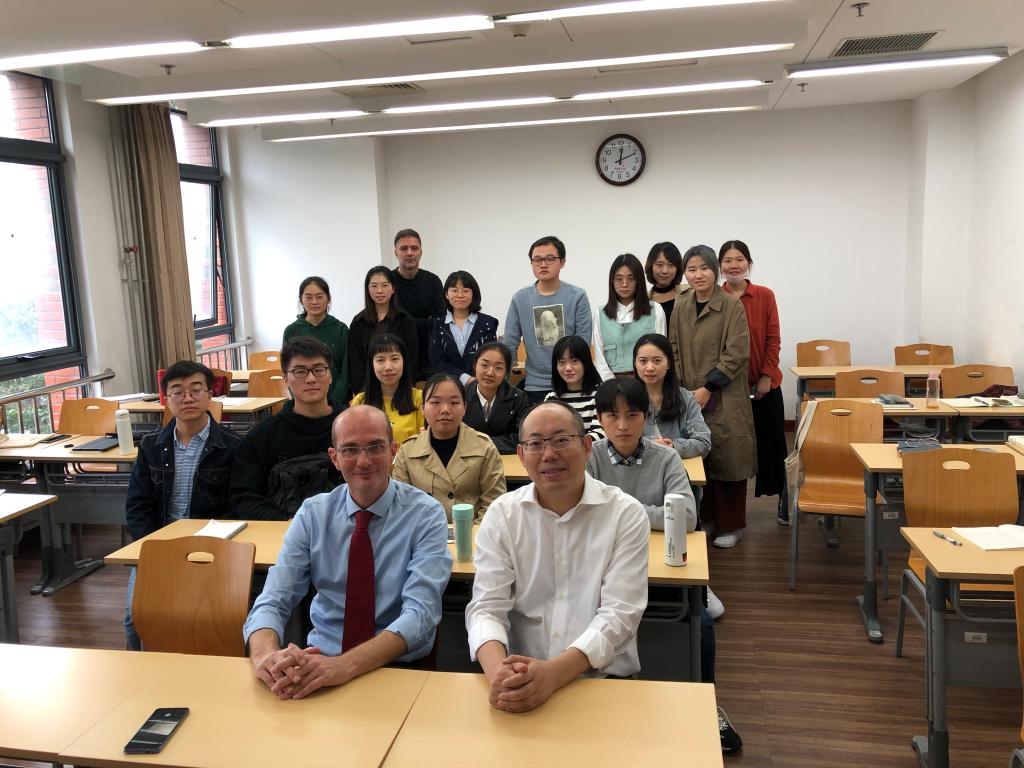At 10 am on October 10, 2019, the 366th Global Human Rights Forum series was held at the A209, Research Building, College Road, China University of Political Science and Law. Associate professor Fabio Massimo Parenti, teaching Globalization, Social Change and War and Media at the Italian International Institute Lorenzo de’Medici , gave a wonderful lecture to the students of Human Rights Institute entitled “Media-War Nexus:The Long History of Propaganda”.
At the beginning of the lecture, Associate professor Massimo discussed with the students about the relationship between media and war, state propaganda and democracy.
Firstly, when it comes to the relations of media and war, we need to think about the credibility of war-related news and whether we need to establish a set of effective standards. In this regard, associate professor Massimo pointed out that we should pay attention to the following elements in our thinking process: government/political institutions, level of independence, author background, and ownership of magazines. On the one hand, the existence of government/political institutions will give domestic news media organizations important influence on independently making objective and true news reports, and government agencies will embellish the content of news in the way of final examination, which is usually to make corrections beneficial to the country. On the other hand, the degree of independence of news organizations also varies in the degree to which news content is affected: the higher the level of news organizations, the less affected they are; on the contrary, the lower the level of news organizations, the less able they are to escape from the first factor. In addition, the author's background can reflect the author's origin and emotional inclination. In general, the national people will subconsciously favor their own country, so as to process and describe the news content with national emotion. Finally, the ownership of magazines is essentially related to all three factors. A magazine in a country is usually created by its own citizens. The credibility of news may be distorted or partially distorted by the interference of national emotion and government agencies.
Secondly, concerning the issue of national propaganda, we need to explore the purposes and means of national propaganda and investigate whether the war propaganda machine still exists. In this regard, associate professor Massimo mentioned four elements for reference: public guidance, public satisfaction/dissatisfaction, emotional manipulation and interest groups. To be specific, it refers to the way that the state guides the public's position through propaganda, and enables the citizens to generate typical tendentious views and emotions so as to create public satisfaction or dissatisfaction on a large scale. The large-scale application of this method of emotional creation and viewpoint manipulation is to realize the needs of the complex interest groups hidden behind the social operation.
Thirdly, for democracy, associate professor Massimo indicated that we need to consider historical determinants and institutional diversity. Specifically, it involves representative system, direct democracy, consultative democracy and other issues.
Associate professor Massimo then introduced the main techniques in the national advocacy/consensus building methodology, which include: first, the repetition of unproven facts (sometimes unverifiable). Second, the repetition of slogans and slogans (meaningless, exaggerated and simplified).Third, falsify and distort the image of the enemy (describing the cruel nature of the enemy).Fourth, use the enemy when appropriate. Fifth, the use of perjury. Sixth, the annihilation of facts against our side. Seventh, create and disseminate information with simplified structure. Associate professor Massimo stressed that the core and nature of the above methods and techniques lie in denying the existence of compromise road and creating the impression and atmosphere of losing or winning. It pointed out that the deep meaning behind the state propaganda lies in that the society is the combination of various forces, and the organizational power operation constitutes the basic structure of the social operation. And the movement of this power creates the need to exploit fear and drive the initiation of national propaganda.
What's more, associate professor Massimo gave a brief introduction to the early studies on the relationship between state propaganda and democracy. It highlighted the news critic Walter Lippmann. As an active supporter of consensus-building through state propaganda, he believed that only a small number of people have the rationality and corresponding skills to govern. Thus, only a small number of pioneers were able to understand and plan the path of social development in the liberal and socialist theoretical traditions .
Finally, Professor Massimo concluded by quoting the following passage from a book called “the sane society.” "Reason is man’s faculty for grasping the world by though, in contradiction to intelligence, which is man’s ability to manipulate the world with the help of thought. Reason is man’s instrument for arriving at the truth, intelligence is man’s instrument for manipulating the world more successfully; the former is essentially human, the latter belongs to the animal part of man. "

Written by Kaili LI